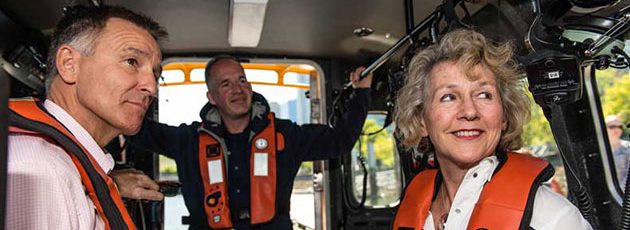[Image: BCIRPU Director Dr. Ian Pike (left), Vancouver MP Joyce Murray, and Chief Executive Officer for Royal Canadian Marine Search and Rescue (RCM-SAR) Pat Quealey (background) aboard a RCM-SAR vessel. Paul Joseph Photo | UBC Public Affairs]
The BCIRPU has received funding from Transport Canada to better understand attitudes about boating safety in British Columbia.
The three-year project—led by BCIRPU Director Dr. Ian Pike, in partnership with the Lifesaving Society, the Royal Canadian Marine Search and Rescue (RCM-SAR), and the Community Against Preventable Injuries (Preventable)—will investigate the awareness, attitudes, and behaviours of recreational boaters in BC related to boating safety. A social marketing campaign will be developed and implemented to address the burden of boating-related injury.
The project was officially announced on May 23 at an event in Vancouver with RCM-SAR, Vancouver MP Joyce Murray, and the BCIRPU research team.
Recreational boaters include paddlers and other operators of human-powered crafts; operators of small power boats (under 6m) and sailboats, and operators of other pleasure crafts. “This project will assess who is at risk of injury while boating and why, and target the attitudes underlying behaviours such as drinking alcohol while boating, and not wearing a personal flotation device,” said Dr. Pike.
“This project will work with the boating community and safety organizations to shift attitudes and behaviours and ultimately reduce the incidence of these preventable events so that the many lakes, rivers, and miles of coastline can be enjoyed safely.”
The project has three phases: first, investigators will review the best available information about recreational boating injuries in BC and create an epidemiological report. The team will conduct market research to understand attitudes, awareness, and behaviours related to boating and develop an effective, targeted social marketing campaign. Second, a multi-platform campaign will be launched across the province based on the outcomes of phase one. Finally, in phase three, researchers will evaluate the campaign, and expand and modify as needed before generating a final report.
UBC News Article (May 23, 2017)
Transport Canada Release (May 23, 2017)

